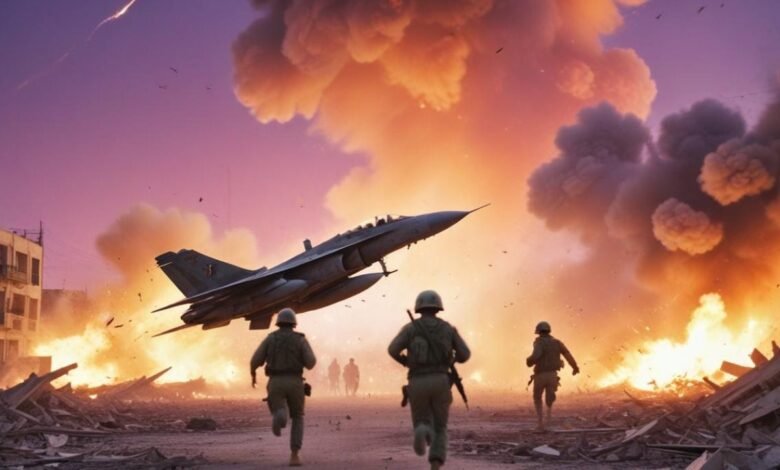
The ongoing conflict between Israel and Iran has escalated dramatically, marking a pivotal moment in Middle Eastern geopolitics. With both nations engaging in military actions and heightened rhetoric, the implications of this conflict extend far beyond regional borders, potentially destabilizing global oil supplies and economic markets. This article delves into the current situation, its historical context, and the broader ramifications for global stability.
Understanding the Current Conflict
Recent Escalations
The most significant recent development in the Israel-Iran conflict occurred when Iran launched a substantial missile barrage against Israel, deploying over 300 projectiles, including drones and ballistic missiles. This attack was perceived as a retaliation for prior Israeli strikes on Iranian assets in Syria, particularly the assault on an Iranian consulate that resulted in multiple casualties among Iranian military personnel. The scale of this direct confrontation signifies a departure from Iran’s previous strategy of engaging through proxy groups like Hezbollah and Hamas, marking a new phase in their long-standing rivalry.
Israel’s Response
In response to Iran’s aggression, Israel has vowed to retaliate decisively. Prime Minister Benjamin Netanyahu stated that “Iran made a big mistake,” indicating that Israel would not tolerate such provocations without consequences. This tit-for-tat dynamic raises concerns about further military escalation, which could draw in regional allies and adversaries alike.
Global Implications of the Conflict
Impact on Oil Supplies
One of the most immediate global concerns regarding the Israel-Iran conflict is its potential impact on oil supplies. The Middle East is a crucial hub for oil production, with Iran being one of the largest producers within OPEC. The Strait of Hormuz, through which approximately 20% of the world’s oil passes, could become a flashpoint if hostilities escalate further. Iran has threatened to disrupt shipping routes in this strategic waterway, which could lead to significant spikes in oil prices globally.
Market Reactions
Historically, geopolitical tensions have led to increased oil prices due to market speculation. Traders often react to news of conflict by preemptively buying oil futures, driving prices higher even before any physical supply disruptions occur. For instance, following the recent missile attacks, Brent crude prices surged past $75 per barrel5. If military actions continue or escalate, we could see even more dramatic fluctuations in oil prices.
Economic Consequences
The economic ramifications of rising oil prices are profound. Countries heavily reliant on oil imports may face increased inflationary pressures as fuel costs rise. For instance, India and other emerging economies could experience significant economic strain due to higher energy costs, potentially leading to broader economic instability. Additionally, Western nations may respond with sanctions against Iran or entities supporting it, further tightening global oil supplies.
Geopolitical Stability
Beyond economics, the Israel-Iran conflict poses broader risks to geopolitical stability. The U.S. has historically been an ally of Israel and may feel compelled to intervene or support Israel militarily if tensions escalate further. Conversely, nations aligned with Iran may increase their support for Iranian military actions or retaliate against U.S. interests in the region. This could create a larger regional conflict involving multiple countries and alliances.
Long-term Considerations
Shifts in Energy Policy
In light of ongoing conflicts and the threat they pose to energy security, many nations may accelerate their transition to alternative energy sources. This shift could alter global energy consumption patterns significantly over time. While immediate reactions might see increased fossil fuel demand and higher prices, long-term strategies may focus on renewable energy investments as countries seek to reduce their dependency on Middle Eastern oil.
Need for Diplomatic Solutions
To mitigate these risks and promote stability in the region, diplomatic efforts must be prioritized. Engaging both Israel and Iran in dialogue facilitated by neutral parties could help de-escalate tensions and prevent further military confrontations. Historical precedents suggest that sustained diplomatic engagement can lead to more stable outcomes than continued military escalation.
Conclusion
The current Israel-Iran conflict is not just a regional issue; it has far-reaching implications for global stability, oil supplies, and economic markets. As both nations engage in increasingly aggressive posturing, the international community must prioritize diplomatic solutions to prevent a broader conflict that could destabilize not only the Middle East but also economies worldwide. The stakes are high—both for those directly involved and for nations around the globe that depend on stable energy supplies and geopolitical peace.
For the latest updates on Current Affairs, click here.
Connect with us on X/Twitter here.



